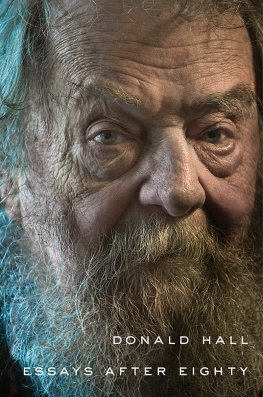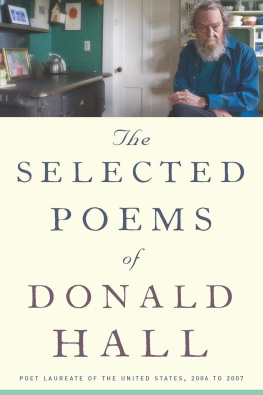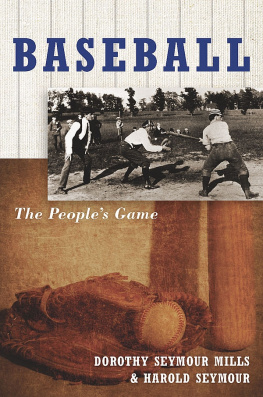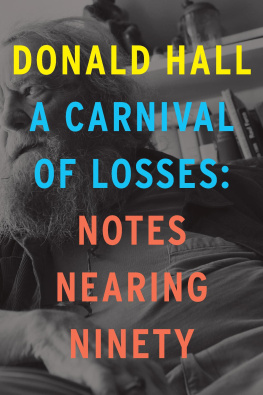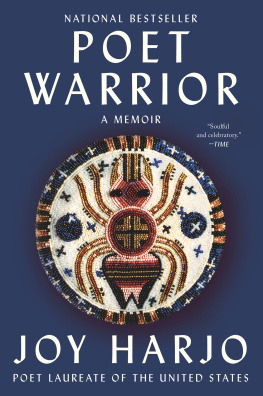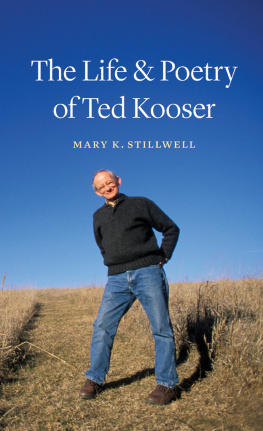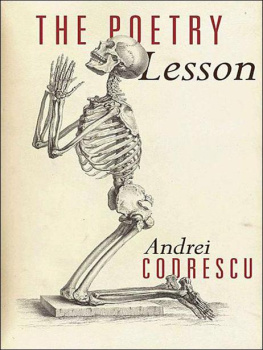Copyright 2008 by Donald Hall
All rights reserved
For information about permission to reproduce selections from this book, write to or to Permissions, Houghton Mifflin Harcourt Publishing Company, 3 Park Avenue, 19th Floor, New York, New York 10016.
www.hmhco.com
The Library of Congress has cataloged the print edition as follows:
Hall, Donald, date.
Unpacking the boxes : a memoir of a life in poetry / Donald Hall.
p. cm.
ISBN :978-0-618-99065-8
1. Hall, Donald, date. 2. Poets, American20th centuryBiography.
3. Poets laureateUnited States. 4. Authorship. I. Title.
PS 3515. A 3152 Z 478 2008
811'.54dc22
[B ] 2008004624
Lines from Elegy Just in Case by John Ciardi are reprinted with the permission of Miller Williams, Literary Executor, the Estate of John Ciardi.
The last stanza of Afternoon at MacDowell by Jane Kenyon, copyright 2004, the Estate of Jane Kenyon, are reprinted from Collected Poems with the permission of Graywolf Press, St. Paul, Minnesota.
e ISBN 978-0-547-34803-2
v4.1216
In Memory of Liam Rector
Domains
A T FOURTEEN I DECIDED to spend my life writing poetry, which is what I have done. My parents supported my desire, or at least did not attempt to dissuade me. My father hated his work, and it was his passion that I should do what I wanted to do. My mother was prevented by her gender and her era (born 1903) from exercising her intense aimless ambition, which settled on me. They worried how I would make a living at poetry, but would not pressure me to join the prosperous family business, the Brock-Hall Dairy in Connecticut, where my father added columns of figures from Monday into Saturday. Their support was affectionate, passive, and generous. Beginning when I was a freshman in high school, they gave me for Christmas and birthdays the many books of poetry I listed for them.
Why did I come to poetry at such an age? A few years ago in Nebraska, talking about my beginnings to high school students, I told about wanting to write because I loved Poe and Keats, later Eliot and Yeats. A skeptical boy asked, Didnt you do it to pick up chicks? Yes! I answered. How could I forget? In the absence of athletic skill, I found that poetry attracted at least the arty girls if not the cheerleaders. Ambition exists to provide avenue for the libido. This notion begets another, less flattering to the peacock male ego: Maybe all women are the one woman, and everything gets done to woo Mom.
My mother died at ninety, in 1994, while my wife Jane Ken-yon was sick. I emptied my mothers house, and a moving van left seventy or eighty boxes at our house and at a cottage we owned down the road. For a long time I could not open them. Three years after Jane died my assistant Kendel Currier moved into the cottage and helped me unpack the boxes. Most of the books would go to the library at the University of New Hampshire. From other boxes my childhood rose like a smoke of moths: a 78 of Connee Boswell singing The Kerry Dance; all the letters I ever wrote my father and mother; photographs of my young parents on the boardwalk at Atlantic City; my fathers colorless Kodachromes of Long Island Sound; snapshots of cats dead for fifty years; model airplanes and toy cars and a Boy Scout manual, a baseball, and a baseball glove with its oiled pocket chewed by mice. I felt the shock and exultation of exhumation.
For weeks I unpacked the boxes, releasing the beginning decades of a life that was concluding its seventh: There were reams of manuscript, a thousand poems, novels I wrote at seventeen and nineteen; high school magazines with my poems and storiesthe antique tracks of poetry and ambition. I found a high school theme called The Wild Heifers. I found a verse play called The Folly of Existence. The unpacked boxes laid out my childhood and adolescence as if they assembled a model train, Lionel Standard Gauge, complete with a miniature village set beside the tracks, a hill for the train to tunnel through, a semaphore, mirror glass for a pond. I recollected earliest childhood, seeing a solemn child, three years old. He looks lonely, discontent, bored. At the height of summer he stands, wearing shorts with socks sliding down ankles over indistinct shoes, holding an indistinct toy beside a gray clapboard house, in heat and dust, under a sun that will not relent. The image resembles a black-and-white photograph, but I dont believe its a remembered snapshot. In family photographs Donnie is spiffed up with his hair combed and water-slicked, his arms stiff at his sides. Donnie was spiffed up and photographed many times: not merely an only child but an only grandchild. Perhaps I was discontent as the focus of the family lens, standing under a sun of singular attention and expectation.
In childhood nothing happened. Born in 1928 as Mickey Mouse wasThomas Hardy died that yearI breathed the air of the Great Depression. Men stood on street corners selling apples and pencils; tramps came to the back doorbut my father had a secure job. My mother and father had married on September 10, 1927, and rented the second floor of a house on Coram Street near Lake Whitney in a neighborhood of Hamden, Connecticut, that developers called Spring Glen. Although my mother had been told that she was unlikely to bear a child, I was born a year and ten days after the wedding. When I was one, my parents moved, renting a small house two miles away in another part of Hamden called Whitneyville, originally the site of housing that Eli Whitney made for workers at his gun factory. (A dam at the end of Lake Whitney supplied waterpower.) By the time my father was born, in 1903, near Whitney Avenue, Whitneys village was becoming a New Haven suburb, and soon a trolley line ran four miles to the citys green. The family business thrived a few blocks from our Winette Street house. The Brock-Hall Dairys horses and wagons delivered milk seven days a week to the back doors of New Haven and its suburbs. Hamden was my fathers place, far from my mothers rural New Hampshire. Sometimes my grandmother Kate visited from the farm, a days journey by train. My grandfather Wesley came rarely; he needed to stay home and tend to the animals. The generations were close in age: My parents were twenty-five when I was born, and Kate was only twenty-five years older.
Nothing happened. Some stories of childhood are tales that grown-ups repeated. I must have been three when I pulled the carrot, and my mother told everyone what Donnie did. She kept a vegetable garden at the bottom of the back yard, and every night before supper she took me with her to pull a fresh carrot for my supper. One evening I walked into the kitchen, a little early, holding my carrot of exemplary intelligence. Memory is stronger when it recalls transgression. I played with a neighbor boy while a repairman worked on the kitchen refrigerator, which had a white coil at its top. The repairmans dented Model T, cut down to a pickup, stood beside the kitchen door on two narrow strips of breaking-apart cement. My playmate and I lifted chunks of concrete onto the pickups bed. My mother, peeking out the screen door, issued a reprimand, and my friend and I set to undo the crime. I stood in the truck bed lifting chunks down to my accomplice, who wore an Indian headdress. I stood above the boy looking down on his head surrounded by feathers, and carefully dropped a large lump of concrete onto his skull. Oh, the bliss of targeting a head circled by feathers! He howled and ran home; I was sent to my room.
Nothing happened. I was small when I wandered a block or two up Augur Street, and sideways into one of the short blocks that paralleled Winette, with no notion of how to get home. Desolation. A tender deliveryman in a red truck returned me to my distraught mother. When I was four I saw my first nude female body. The three-year-old daughter of friends of my parents, who also lived on Winette, came dashing naked out of her house as I walked up the street. I remember my wicked joy as I watched a flustered grandmother run from the house and grab Molly back into privacy. License and rapture began with this vision. My fathers parents lived nearby. After a blizzard, my grandfather Henry Hall, who loved horses, had his picture in the
Next page
